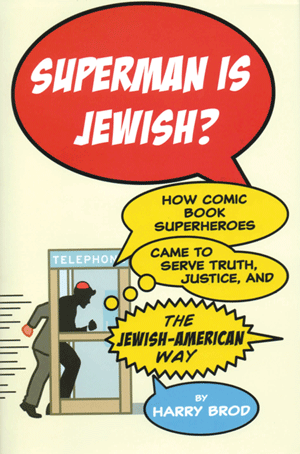Reviewed by NEAL GENDLER
Is Superman Jewish?
Yes, very much so, at least in his early years, but in his character, not his personality. The later Spider-Man, conversely, is Jewish in personality but not in character.
Who knew?
Harry Brod does. A philosophy and humanities professor at the University of Northern Iowa, Brod provides an insightful explanation of how young Jewish guys with immigrant parents or grandparents created the comic-book industry and “overtly or covertly… inscribed their Jewish identities into their comic-book superhero creations.”
Brod says: “The history of Jews and comic-book superheroes, that very American invention, is the history of… Jewish assimilation into the mainstream of American culture.” His book “isn’t a chronicle of the Jews in comics, it’s a story of the influence of Judaism and Jewishness on comics.”
Consider Superman, who “inaugurated the entire genre of comic-book superheroes,” created in 1938 by 23-year-old Cleveland Jews Jerry Siegel and Joe Shuster. Baby Superman — Kal El, rather like Hebrew for “all is God” or “all for God” — is sent to a new world to save him from a world about to explode. Think of Europe that year.
Superman embodies some positive features of the Jews’ mythical Golem, but he’s the obverse of later superheroes, humans who perform their feats in disguise; Superman is his real identity and Clark Kent is fictitious.
“People see him as timid, socially inept, physically weak, clumsy, wears glasses,” in other words, a 1938 stereotype of Jewish males. And unlike later superheroes, Superman isn’t avenging any wrong done to him or his family; it’s all mitzva work.
“It is the combination of Superman’s invincibleness and the nebbish-like characterization of Clark Kent that makes Superman such a Jewish character,” Brod says. “The two contrasting types are deeply ingrained in Jewish culture,” but oppositely, as bookish Jews detached from physical labor and their countertype, the gentile “hypermale” of woods, fields and factories. “Siegel and Shuster’s intuitive stroke of genius was to combine the superman and the super nerd into a single character.”
Spider-Man, with his humor and anxieties, “is a post-Holocaust American Jew, and the guilt that plagues and motivates him is a specific post-Holocaust American-Jewish guilt,” Brod says. Spider-Man starts fighting crime after his Uncle Ben and Aunt May, who raised him, are killed by a burglar. The Peter Parker character realizes the burglar is the one he let run past him to escape the police. Parker was placed in New York’s Forest Hills, a neighborhood of Queens where Brod grew up amid Jews from Eastern Europe, including Shoah survivors.
Brod sounds like a professor we would enjoy. His is a serious work that often is light-hearted, amusing and generally clear, deliberately avoiding the obscure vocabulary with which so many academics write, apparently to impress each other. But the book just begs for more illustrations and an index.
Brod makes a solid case that the Jewish sensibilities in comic-book superheroes came consciously or subconsciously from their creators and aren’t just the inferences of scholars seeking clues to justify a theory.
What makes a book Jewish? Brod says: “The Jewish elements of the work need not be explicit, nor do the characters need to be explicitly identified as Jewish, but an informed Jewish reader should be able to see how Jewish themes or ideas are central.” Second, there should be some “line of transmission” in which the creator “could plausibly have come into contact with the Jewish elements” present.
Brod tells the stories other well-known Jewish superhero creators, including Jack Kirby (Jacob Kurtzberg), co-creator with Joe Simon of the hugely successful “Captain America,” and Will Eisner of “The Spirit,” and gives the history of Mad magazine.
My interest waned when Brod got into comics and creators I don’t know, but my eyes perked up in his insightful chapter on “the genius of Art Spiegelman’s graphic novel Maus,” the counterintuitive, Pulitzer Prize-winning Shoah work that led Americans to take the format seriously.
Spiegelman showed that Jews need no superpowers, that even as mice they can be heroic.
***
Neal Gendler is a Minneapolis writer and editor.
(American Jewish World, 12.7.12)





















